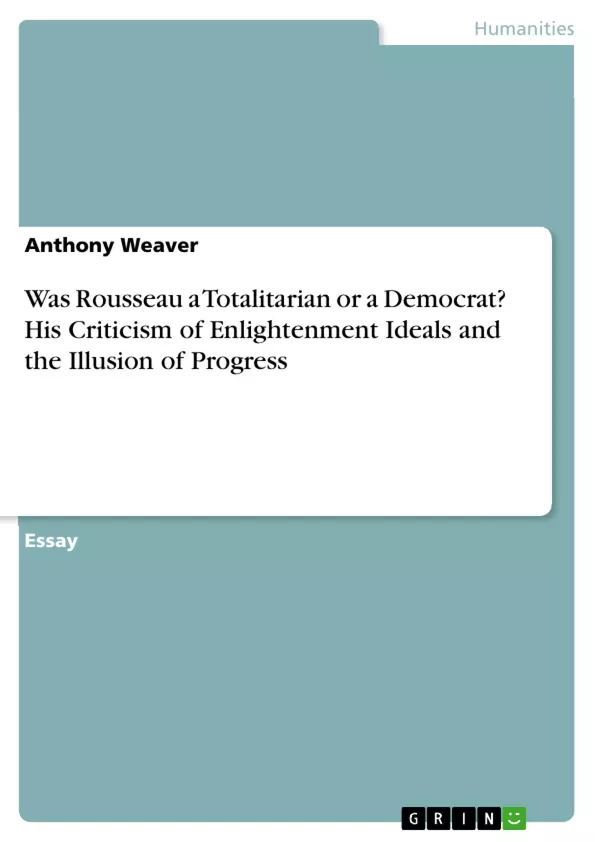This paper explores Rousseau's critique of Enlightenment ideals, his warnings against inequality and self-interest in society, and his influence as a precursor to the Romantic movement. Jean-Jacques Rousseau, a prominent philosopher of the French Enlightenment, stood in contrast to many of his contemporaries by rejecting key aspects of the Enlightenment's rationalism and belief in progress. While philosophers like Voltaire and Diderot celebrated the advancements of modern science and its potential to improve society, Rousseau argued that these very developments contributed to moral decline. In works like "A Discourse on the Moral Effects of the Arts and Sciences" and "Discourse on Inequality", Rousseau contended that true virtue and happiness were rooted in humanity's natural state, which had been corrupted by modern civilization.
Table of Contents
- Introduction
- The French Enlightenment
- The Social Contract
- Is Rousseau a Totalitarian?
Objectives and Key Themes
This work aims to analyze Jean-Jacques Rousseau's political philosophy, specifically addressing the question of whether his ideas align with totalitarian or democratic principles. It examines Rousseau's critique of the Enlightenment, his concept of the social contract, and the implications of his "General Will."
- Rousseau's critique of the Enlightenment and its emphasis on reason and progress.
- The concept of the social contract and the role of the "General Will" in Rousseau's ideal state.
- The tension between individual liberty and the collective good in Rousseau's political thought.
- Analysis of Rousseau's concept of the "General Will" and its potential for both democratic and totalitarian interpretations.
- Examination of the implications of Rousseau's "civil religion" and its potential for intolerance.
Chapter Summaries
Introduction: The introduction sets the stage by presenting Rousseau's philosophical context within the French Enlightenment and highlighting his contrasting views on reason, progress, and the nature of humankind. It introduces Rousseau's core idea that humans are inherently good but corrupted by society.
The French Enlightenment: This section contrasts Rousseau's philosophy with the dominant ideas of the French Enlightenment, emphasizing the differences in their approaches to reason, science, and the understanding of human nature. Rousseau's rejection of the notion of progress as an illusion is a key focus.
The Social Contract: This section delves into Rousseau's theory of the social contract, examining his concept of the "state of nature," the "noble savage," and the transition to civil society. The importance of the "General Will" in establishing an ideal republic is introduced, along with the idea that the people become both ruler and ruled. Rousseau's use of examples from the Swiss Confederation to illustrate his concept of direct democracy is also explored.
Is Rousseau a Totalitarian?: This chapter analyzes arguments for and against characterizing Rousseau's philosophy as totalitarian. It discusses Rousseau's controversial doctrine of civil religion and its potential for intolerance, considering the tension between the concept of the "General Will" as a democratic decision and a transcendent common interest. The chapter explores critiques from figures such as Frédéric Bastiat and acknowledges potential limitations or paradoxes within Rousseau's political thought.
Keywords
Jean-Jacques Rousseau, French Enlightenment, Social Contract, General Will, Direct Democracy, Totalitarianism, Civil Religion, Natural Law, State of Nature, Noble Savage, Amour-propre, Liberty, Equality, Virtue.
- Quote paper
- Anthony Weaver (Author), 2024, Was Rousseau a Totalitarian or a Democrat? His Criticism of Enlightenment Ideals and the Illusion of Progress, Munich, GRIN Verlag, https://www.grin.com/document/1506312



